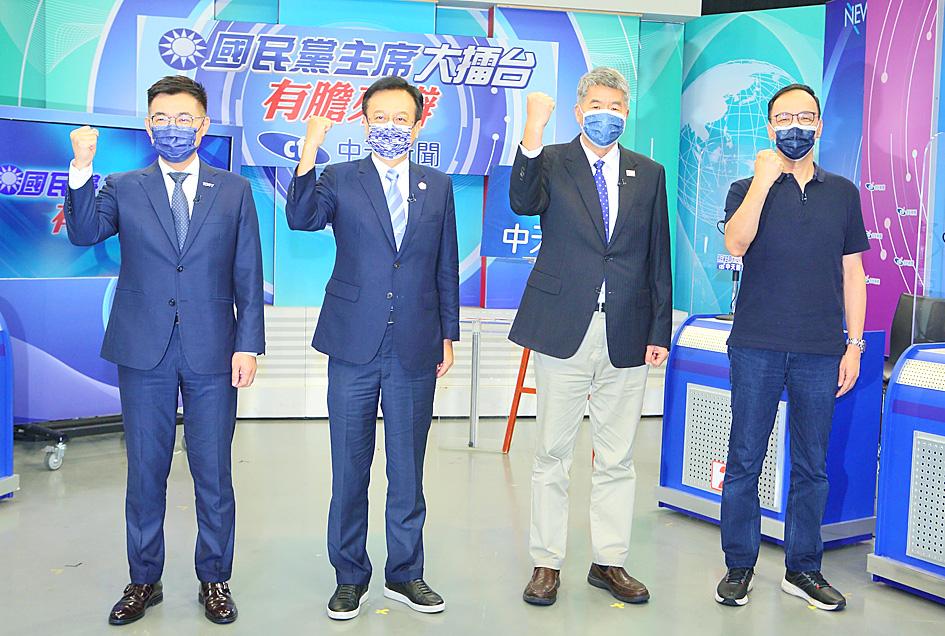Chinese Nationalist Party (KMT) chairperson candidates yesterday focused on the so-called “1992 consensus” during a televised policy debate ahead of next week’s election.
KMT Chairman Johnny Chiang (江啟臣) said the party should return to the “original definition of the consensus,” adding that the concept was no longer a poison pill for voters, as the Democratic Progressive Party (DPP) had demonstrated its inability to handle cross-strait relations.
The “1992 consensus” — a term that former Mainland Affairs Council chairman Su Chi (蘇起) in 2006 admitted making up in 2000 — refers to a tacit understanding between the KMT and the Chinese Communist Party (CCP) that both sides of the Taiwan Strait acknowledge that there is “one China,” with each side having its own interpretation of what “China” means.

Photo courtesy of CTV
Former KMT chairman Eric Chu (朱立倫) said that he has also emphasized that each side has its own interpretation of the “1992 consensus” and had reiterated this to Chinese President Xi Jinping (習近平) when they met in 2015.
“In essence, there must be a creative ambiguity, instead of clear-cut clarity,” Chu said.
Sun Yat-sen School president Chang Ya-chung (張亞中) said that while the “1992 consensus” should remain the party’s guiding principle, it is outmoded and can no longer address the political situation of cross-strait relations.
If elected, he said he would visit Beijing to find common ground that both sides can accept and to sign a memorandum of understanding for peace, adding that this would require that both sides take a step back.
Former Changhua County commissioner Cho Po-yuan (卓伯源) said that the DPP’s abandonment of the “1992 consensus” has led to heightened tensions across the strait, adding that he believed attempts to deepen the “consensus” would be the way toward peace.
On whether the party should change its name, Chu said he was “absolutely against” changing it to “Taiwan Kuomintang.”
Such an act would sever the party from its past, he said, adding that the KMT should push against efforts to create pro-Taiwan independence high-school curricula, which would mislead young people about the nation’s roots.
Chang said the KMT was founded by Sun Yat-sen (孫逸仙) and had a century’s history and glory to its name, adding that the word Chinese (中國) in the party’s official name also held meaning.
“It is a place that our revolutionary forefathers spilled blood for,” Chang said, adding that the word does not simply mean the People’s Republic of China, as “it also means us. We are Chinese. Taiwanese are Chinese, as they are also Taiwanese.”
During the debate, Chu said that if Chang were elected, he would steer the KMT toward rapid unification, while Chang said that he was “extremely unhappy” that Chu was attempting to divide the party.
Instead of lobbing accusations that the KMT is leaning toward China and selling out the country or that the DPP is simply a stooge for the US, Chiang said that the country needs to sit down with the CCP to discuss matters, adding that he is willing to visit China should he be re-elected.
He said that the KMT must bring the fight to the DPP, as Taiwanese have for a long time been subject to a single source of information.
The KMT chairperson election is set for Saturday next week.

DEFENSE: The National Security Bureau promised to expand communication and intelligence cooperation with global partners and enhance its strategic analytical skills China has not only increased military exercises and “gray zone” tactics against Taiwan this year, but also continues to recruit military personnel for espionage, the National Security Bureau (NSB) said yesterday in a report to the Legislative Yuan. The bureau submitted the report ahead of NSB Director-General Tsai Ming-yen’s (蔡明彥) appearance before the Foreign and National Defense Committee today. Last year, the Chinese People’s Liberation Army (PLA) conducted “Joint Sword-2024A and B” military exercises targeting Taiwan and carried out 40 combat readiness patrols, the bureau said. In addition, Chinese military aircraft entered Taiwan’s airspace 3,070 times last year, up about

The Overseas Community Affairs Council (OCAC) yesterday announced a fundraising campaign to support survivors of the magnitude 7.7 earthquake that struck Myanmar on March 28, with two prayer events scheduled in Taipei and Taichung later this week. “While initial rescue operations have concluded [in Myanmar], many survivors are now facing increasingly difficult living conditions,” OCAC Minister Hsu Chia-ching (徐佳青) told a news conference in Taipei. The fundraising campaign, which runs through May 31, is focused on supporting the reconstruction of damaged overseas compatriot schools, assisting students from Myanmar in Taiwan, and providing essential items, such as drinking water, food and medical supplies,

STRICTER ENFORCEMENT: Taipei authorities warned against drunk cycling after a sharp rise in riding under the influence, urging greater public awareness of its illegality Taipei authorities have issued a public warning urging people not to ride bicycles after consuming alcohol, following a sharp rise in riding under the influence (DUI) cases involving bicycles. Five hundred and seven people were charged with DUI last year while riding YouBikes, personal bicycles, or other self-propelled two-wheelers — a fourfold increase from the previous year, data released by the Taipei Police Department’s Traffic Division showed. Of these, 33 cases were considered severe enough to be prosecuted under “offenses against public safety,” the data showed. Under the Road Traffic Management and Penalty Act (道路交通管理處罰條例), bicycles — including YouBikes and other

A magnitude 4.3 earthquake struck eastern Taiwan's Hualien County at 8:31am today, according to the Central Weather Administration (CWA). The epicenter of the temblor was located in Hualien County, about 70.3 kilometers south southwest of Hualien County Hall, at a depth of 23.2km, according to the administration. There were no immediate reports of damage resulting from the quake. The earthquake's intensity, which gauges the actual effect of a temblor, was highest in Taitung County, where it measured 3 on Taiwan's 7-tier intensity scale. The quake also measured an intensity of 2 in Hualien and Nantou counties, the CWA said.